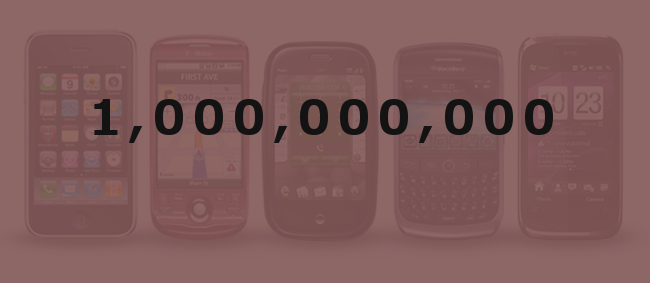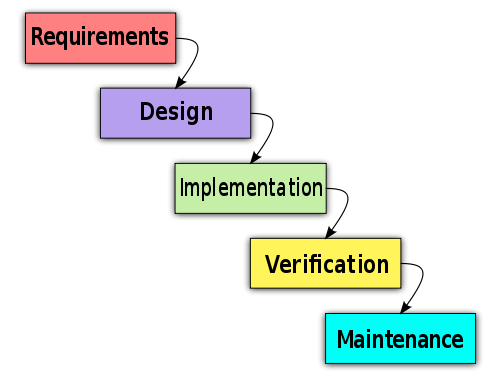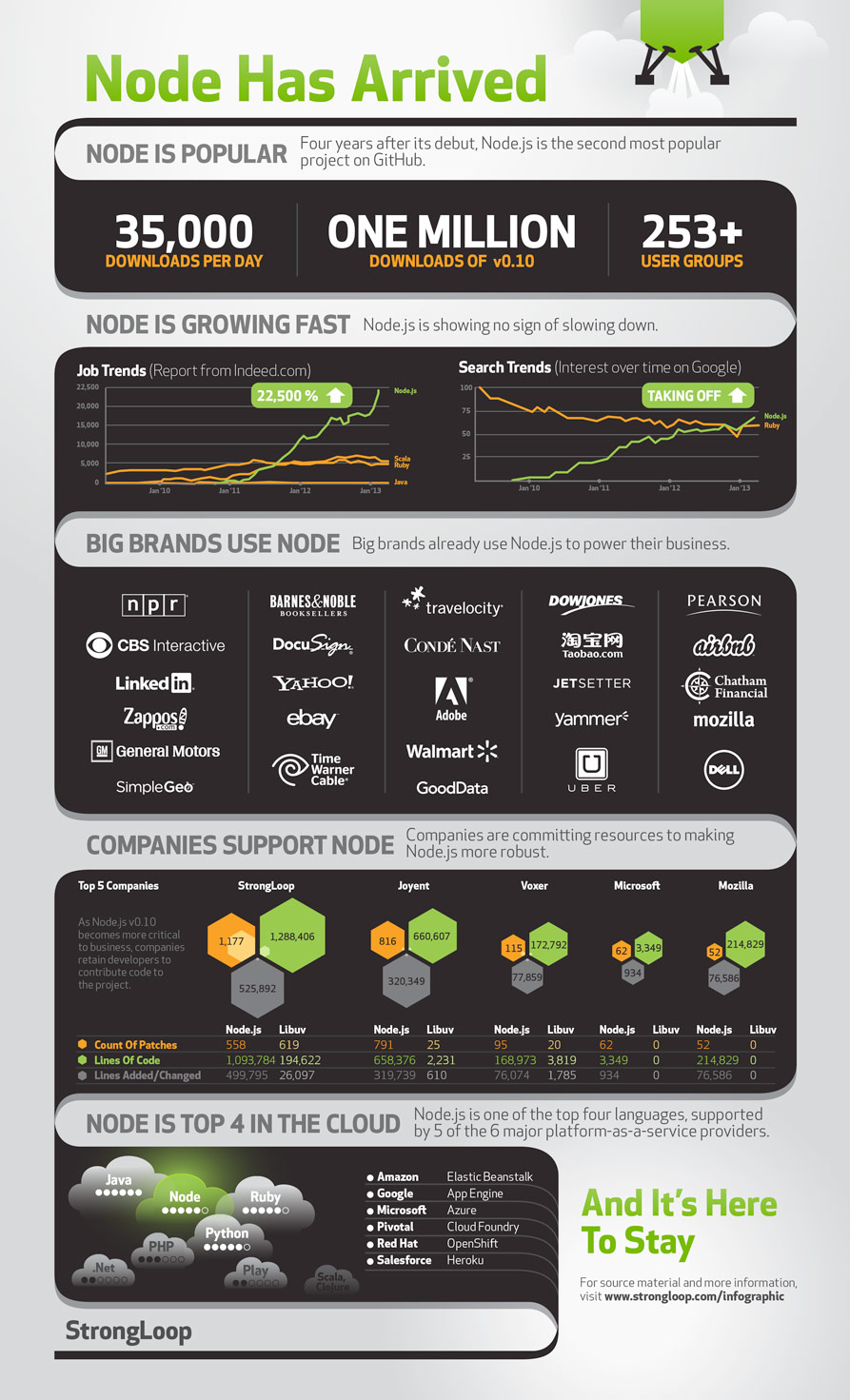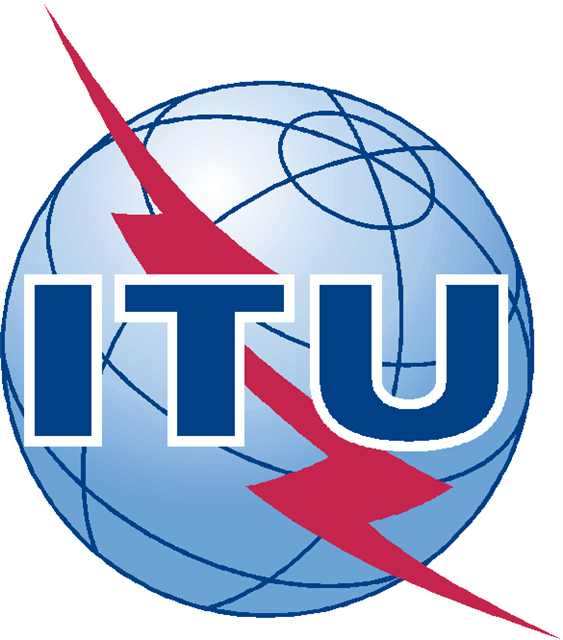Remember a while back when I wrote that Node.js is popular and getting moreso?
Well, today I came across a blog that explains why.
In the very clearest terms.
Bookmark this: How Node.js is Going to Replace JavaScript
Category: Quickies
Node.js is popular and getting moreso
Must Love Clouds

Apigee is looking for a few good SEs.
An SE is a Sales Engineer. At Apigee, this is a member of the sales team who’s very technically adept, loves technology, and loves talking to other technologists about how to apply cool technology to solve hard problems.
This person needs to have a good developer background in server-side apps programming, with good C++, Java or C# skills, and probably one or more of Python, Ruby, PHP and NodeJS. Of course should know APIs, REST, SOAP very well, and should be handy with JSON, XML, and the various tools around those. Ought to know who Roy Fielding is, why jQuery is named jQuery, should know what RFC 2616 is, must love clouds, big data. Experience with AWS, Azure, RackSpace, VMware or IBM Smartcloud is a big plus. Beyond all that, the person’s got to love dealing with smart people with different perspectives.

If you know someone who fits this bill, lives near one of the NFL cities in the USA (you know, New York, Boston, Atlanta, Dallas, Houston, Chicago, Denver, San Fran, Los Angeles, etc), and wants to work for an ambitious late stage startup, send em my way: @dpchiesa on twitter.
Bruce Schneier is, once again, right.
Bruce Schneier is often right.
And he’s right again. Edward Snowden is doing the country a great service, by exposing the NSA data collection program.
Mac OS Dock disappears… what to do?
Periodically, the dock at the bottom of my MacOS screen just… vanishes.
Unclear what causes this.
All the windows still work, but without the dock navigating between windows is a hassle.
Previously I had resorted to a reboot to correct this.
Just found this tip.
In short:
- In a terminal window:
killall Dock - Command-Option-D
The dock is back.
US balks at ITU Treaty; Government vs Big (Internet) Business
At the WCIT in Dubai, the US has refused to sign the ITU Treaty establishing global regulations for dealing with the Internet.
ITU is an UN agency, part of a global government or quasi-government effort. This isn’t conspiracy theory; this is just fact. The UN attempts to establish rules governing global behavior.
A number of governments, including China, Russia, Iran, Saudi Arabia, many African nations, and other “closed” societies have voted in favor of the ITU Treaty, which includes provisions for how the Internet can be regulated. In short, these are not lovers of liberty. The concerns about their interests in restricting the public Internet are not new.
The US has voted against the treaty. Certainly the commercial interests in the US, including companies like Google who are focused on advertising, and content-providers like Disney, are against the regulation of the global network as it restricts their access to vast new oceans of potential customers. I can understand the reluctance of some countries to open up to the “assault” on their people of US-oriented commercial interests via the public network. I can understand it but I don’t condone it.
I am flatly against the mullahs in Iran approving what’s ok for me to read on the Internet in Seattle, Washington. I also think that, without democratic elections, these people and their counterparts in Saudi, Russia, China, and many other countries, have no moral authority to make similar decisions for the people that live in their respective countries.
Let the closed societies try to regulate the Internet within their borders if they want to. It won’t work. As we see in Iran, China, and other places, the information will get in and out, eventually. People want the freedom to educate themselves. The US should not back up one bit from its stance on this.
The Internet is a much more effective spreader of democracy than 3 battalions of US Marines.
Related: Dvorak on the ITU Treaty
One billion smart phones, and counting

From C|Net, Strategy Analytics reports that there are now more than 1 billion smartphones in use on the planet. The story has been picked up by other places, too.
One billion is a big number, there’s no question about that. But what people are glossing over is that the number is +46% in one year. That’s is a HUGE jump.
Apple, Samsung and Nokia, with their partners, are obviously making things that people want. Somehow HTC is missing out on the gravy train. While the market is thumping along, HTC has reported their lowest profit since 2006. Time for the board to take action.)
Aside from the mobile handset space, with that kind of scale it is easy to imagine some pretty outsize opportunities in complementary markets. Like, for example, in connecting all those phones to cloud-based resources. I guess there would have to be a way for software programs running on the handsets, to be able to connect with the cloud. Some kind of programmatic interface – an API, perhaps?
And then on the cloud-side – and by cloud I mean anything that is not tethered to the phone, anything that is reached over the internet – there oughtta be some way for cloud-based service providers to manage the deluge of API access, to measure it, to rate-limit, examine it.
Hmmmm, I wonder if there’s a company that could help with that?
HBR Blogger says Projects built on Short, Iterative cycles might just work
Harvard Business Review publishes an aggregated blog. I like the content there, because there are varied perspectives from different writers, and the posts span a number of different topic areas. Recommended.
Better than Waterfall?

Recently, Jeff GotHelf posted an item comparing the old-school waterfall software development project management approach with a novel approach based on short, iterative development cycles with lots of customer feedback.
He thinks this new, unnamed project management model might actually bring some benefits. !! Hmm, I’ll have to check it out. 😉
WaPo article on last week’s Cloud failures

When the Washington Post publishes an article on the failure of cloud computing infrastructure, it’s not going to be good. Enterprise CIOs all over the world are re-thinking their plans to commit to hosted services.
See also, How to Discourage Adoption of Public Cloud by Enterprises
How to Discourage Adoption of Public Cloud by Enterprises


